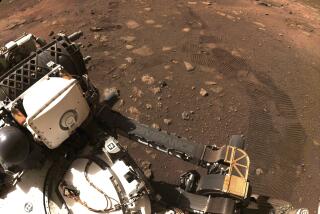NASA Mars Curiosity rover starts rolling to Glenelg Intrigue
NASA’s Mars Curiosity rover is on the move toward a key point of interest -- a spot about a quarter-mile southeast of its landing site that may become the rover’s first drill target.
That spot, called Glenelg Intrigue, lies at the confluence of three different types of terrain -- and scientists working on the Mars Science Laboratory mission plan to use Curiosity to investigate what sort of geological history brings such different types of rocky material together.
One of the three types, which looks to be layered bedrock, is likely to be a potential target for the rover’s drill, a tool that can bore into rock in order to take samples and analyze them in the robot’s chemical belly.
The rover set out Tuesday, covering 52 feet eastward. The trip to Glenelg would be the rover’s first extended driving journey: previous rover drives lasted a matter of several feet.
Curiosity has snapped photos of the surrounding terrain in Gale Crater, where it touched down Aug. 5. In the middle of the crater lies Mt. Sharp, a 3-mile-high mound whose layers contain a record of the Red Planet’s early history and may even host some of the ingredients for life.
Glenelg is a slight detour from that ultimate plan, but it’s probably not the only pit stop. That’s why, even though the journey to Mt. Sharp would theoretically only take about 100 days if the rover was driving flat out at top speed, the trip is expected to take the better part of a year.
The drive to Glenelg is expected to take weeks, according to project scientist and Caltech geologist John Grotzinger.
Follow me on Twitter: @aminawrite





